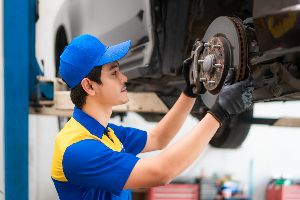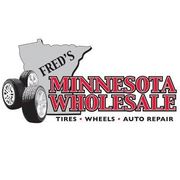How Cold Weather Affects Brakes

Automotive braking systems consist of rotors, calipers, and pads that work together to promote deceleration and bring a vehicle to a complete stop. However, winter conditions often cause problems that necessitate professional brake repairs. Here's what cold weather can do to brakes and how to prevent issues.
How Can Cold Weather Impact Your Vehicle's Brakes?
1. Overheating
When snow and water make contact with braking components, this reduces their efficacy, causing you to apply more pressure to the pedal to slow and stop your vehicle. If the vehicle is older and you don't have ABS, you might also need to pump the brakes to regain control while hydroplaning, skidding, or sliding. As a result, braking components generate excess heat from friction, leading to compromised deceleration and rapid wear.
You can avoid this by braking as smoothly as possible during winter. Increasing the distance between your vehicle and the one in front of you will also give you more time to slow down, reducing the need to slam on your brakes. Additionally, have your brakes serviced by a mechanic at least once during the cold season.
2. Damaged Lines
Brake fluid is a hydraulic liquid that increases pressure between rotors, pads, and calipers to assist with stopping. Though this fluid is unlikely to freeze, the lines that transport it through the braking system might become damaged when exposed to cold air and moisture. For instance, if water seeps into the lines, it can freeze and expand when outdoor temperatures plunge below 32 degrees, causing the lines to crack or tear. Additionally, cold air dries out the lines, causing cracks and holes to form that allow fluid to seep out.

Parking in enclosed, warmer areas reduces elemental exposure to protect the lines. Adhering to your vehicle's manufacturer-recommended service plan regarding brake repairs and maintenance helps you avoid winter damage.
3. Corrosion
Vehicles generate heat while operating, which helps melt snow quickly. When this moisture makes contact with metal braking components, such as rotors and calipers, they have a greater risk of rusting. If this happens, you might notice reduced braking power, delayed deceleration, and loud squealing or squeaking noises when you press the brake pedal. De-icer products also contain chemicals that can accelerate winter corrosion, causing more extensive rusting.
The best way to avoid these issues is by parking your vehicle in covered, enclosed spaces as often as possible during winter. Additionally, wash your car once or twice monthly—including the undercarriage—to remove chemicals that may exacerbate corrosion.
If you notice trouble with your braking system, get in touch with Fred Jr's MN Wholesale Tires, Wheels & Auto Repair. These mechanics provide auto services, including brake repairs and routine maintenance, to drivers throughout Forest Lake, MN. Call (651) 272-5610 to request an estimate from this auto shop, and visit the website to learn more about how they can keep your vehicle fully functional.
About the Business
Have a question? Ask the experts!
Send your question

